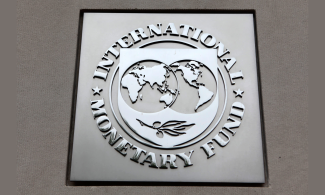
Image Credit: REUTERS
Nigeria and some other countries have intensified their campaign to get Western countries to reduce or cancel their debts.
The countries made a request for debt relief and presented a series of appeals at the ongoing meeting of the International Monetary Fund (IMF) and World Bank in Marrakech, Morocco, the G-24, of which Nigeria is a member, The Nation reports.
During the meeting, the G-24 members expressed their apprehension regarding the escalating and substantial levels of public debt faced by numerous developing countries.
The nations also emphasized that they are grappling with unsustainable debt, making it challenging for them to meet their repayment obligations.
While acknowledging the G-20 Common Framework, which is a debt relief initiative by the Group of Twenty (G-20) countries, members of the G-24 noted that some of the poorest and most vulnerable countries are not benefiting from this debt relief programme.
They therefore called for a durable debt resolution specifically designed to address the debt problems of those excluded countries. They also called for a more comprehensive and sustainable solution to alleviate the burden of debt for these countries and enable their economic growth and development.
However, Nigeria’s Minister of Finance and Coordinating Minister for the Economy Mr Wale Edun at the Africa Group 1 Constituency Meeting on the sidelines of the IMF/World Bank meeting stated that “our member statement urges an efficient debt resolution framework to support post-pandemic recovery and we indeed welcome Zambia’s debt restructuring agreement and call for swift resolution mechanisms for Ethiopia and Malawi”.
The G-24 members also called for more concessional lending, especially for investments in global public goods and sustainable development such as affordable water and energy.
Edun also called for the “elimination of export restrictions on fertilizer and grains, avoiding protectionist policies and leveraging the normalization of supply chains and shipping costs to reinvigorate global trade”.
At the G-24 meeting, Edun and other finance ministers expressed their concern about the progress on the IMF general quota review.
IMF general quota refers to the monetary contribution made by each member country to the International Monetary Fund (IMF).
This quota determines the country’s relative financial and voting power in the institution. The quota is assessed based on each member country’s share of the world economy, including its GDP, openness to trade, and international reserves.
The IMF uses the general quota to fund its lending activities and to provide financial stability to member countries facing economic difficulties. It also plays a vital role in decision-making processes regarding policies and strategies for the organization.
Edun and his fellow finance ministers reiterated their call for the IMF “to remain a quota-based institution in order to bolster the voice and representation of the emerging market and developing economies, who now account for a larger share of world GDP”.
Meanwhile, the senator representing Ondo South Senatorial District, Dr. Jimoh Ibrahim, has called for the swapping of Africa’s debts with the disasters and other pains the continent has been undergoing due to climate change.
Speaking with journalists at the end of a session at the ongoing World Bank/IMF Annual Meetings in Marrakech, Morocco, Ibrahim, recommended that Africa’s debts, particularly that of Nigeria, be swapped for the pains of climate change coming from the United States of America, China, Russia, Germany and other developed economies.
The Nigerian lawyer and businessman explained: “Africa is hugely in debt, using $50 billion every year to service debts without paying the debtor,” which to him was worrisome to the entire world.
“What I told the IMF and World Bank is that there is a climate change issue impacting the continent.
“Carbon dioxide is polluted by the plethora of cars in America and burning of fossils. This is really affecting Africans and their health.”
“The consequences should be paid by the pollutant and they should pay for the damages that erupt in the African continent because disaster does not require a visa to travel.
“Who is going to pay for the burning of fossils and pollution of carbon dioxide in Africa,” he added.
According to Ibrahim, “the IMF is looking at this seriously and they asked me a question: How do we quantify the damages? But I told them, we have data. “We don’t produce cars in Africa, but the whole world uses cars. These cars are produced in either Germany, America, Russia, China and India.
“Imagine the number of cars in the world and burning fossil oil is the consequence of all the disasters we see which leads to manipulation of carbon dioxide which is what we breathe in as oxygen.”